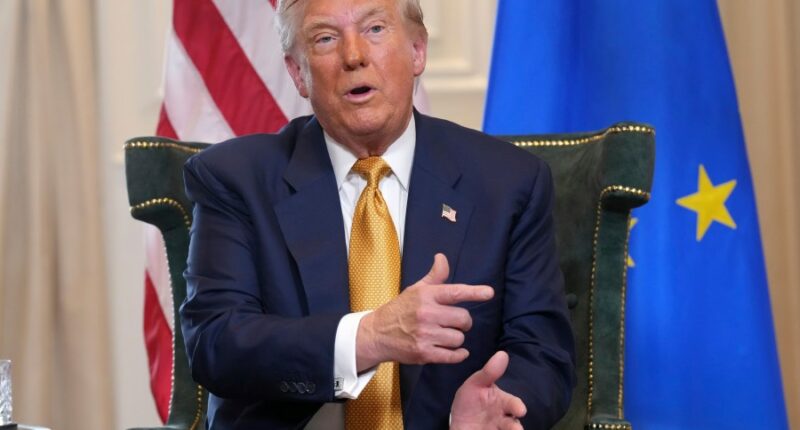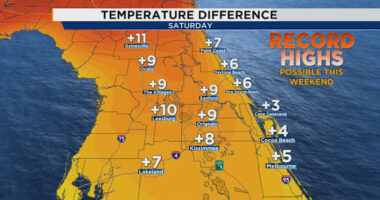Share this @internewscast.com
FRANKFURT, Germany (AP) — President Donald Trump and European Commission President Ursula von der Leyen have announced a comprehensive trade deal that enacts 15% tariffs on most European goods, avoiding Trump’s threat of a 30% rate if an agreement had not been reached by Aug. 1.
The tariffs, or import taxes, paid when Americans purchase European products could increase prices for U.S. consumers and reduce profits for European companies and their partners who import goods into the country.
Here are some things to know about the trade deal between the United States and the European Union:
Many details remain to be decided
Trump and von der Leyen’s announcement, made during Trump’s visit to one of his golf courses in Scotland, leaves many details to be filled in.
The main point is a 15% tariff rate on “the vast majority” of European goods imported into the U.S., including cars, computer chips, and pharmaceuticals. This is lower than the 20% Trump initially proposed, and also lower than his previous threats of 50% and then 30%.

Von der Leyen said the two sides agreed on zero tariffs on both sides for a range of “strategic” goods: Aircraft and aircraft parts, certain chemicals, semiconductor equipment, certain agricultural products, and some natural resources and critical raw materials. Specifics were lacking.
She said the two sides “would keep working” to add more products to the list.
Additionally, the EU side would purchase what Trump said was $750 billion (638 billion euros) worth of natural gas, oil and nuclear fuel to replace Russian energy supplies, and Europeans would invest an additional $600 billion (511 billion euros) in the U.S.
50% U.S. tariff on steel stays and others might, too
Trump said the 50% U.S. tariff on imported steel would remain; von der Leyen said the two sides agreed to further negotiations to fight a global steel glut, reduce tariffs and establish import quotas — that is, set amounts that can be imported, often at a lower rate.
Trump said pharmaceuticals were not included in the deal. Von der Leyen said the pharmaceuticals issue was “on a separate sheet of paper” from Sunday’s deal.
Where the $600 billion for additional investment would come from was not specified. And von der Leyen said that when it came to farm products, the EU side made clear that “there were tariffs that could not be lowered,” without specifying which products.
The 15% rate is higher than in the past
The 15% rate removes Trump’s threat of a 30% tariff. It’s still much higher than the average tariff before Trump came into office of around 1%, and higher than Trump’s minimum 10% baseline tariff.
Higher tariffs, or import taxes, on European goods mean sellers in the U.S. would have to either increase prices for consumers — risking loss of market share — or swallow the added cost in terms of lower profits. The higher tariffs are expected to hurt export earnings for European firms and slow the economy.
The 10% baseline applied while the deal was negotiated was already sufficiently high to make the European Union’s executive commission cut its growth forecast for this year from 1.3% to 0.9%.
Von der Leyen said the 15% rate was “the best we could do” and credited the deal with maintaining access to the U.S. market and providing “stability and predictability for companies on both sides.”
The reaction is tentative
German Chancellor Friedrich Merz welcomed the deal which avoided “an unnecessary escalation in transatlantic trade relations” and said that “we were able to preserve our core interests,” while adding that “I would have very much wished for further relief in transatlantic trade.”
The Federation of German Industries was blunter. “Even a 15% tariff rate will have immense negative effects on export-oriented German industry,” said Wolfgang Niedermark, a member of the federation’s leadership.
While the rate is lower than threatened, “the big caveat to today’s deal is that there is nothing on paper, yet,” said Carsten Brzeski, global chief of macro at ING bank.
“With this disclaimer in mind and at face value, today’s agreement would clearly bring an end to the uncertainty of recent months. An escalation of the US-EU trade tensions would have been a severe risk for the global economy,” Brzeski said.
“This risk seems to have been avoided.”
Car companies expect higher prices
Asked if European carmakers could still sell cars at 15%, von der Leyen said the rate was much lower than the current 27.5%. That has been the rate under Trump’s 25% tariff on cars from all countries, plus the preexisting U.S. car tariff of 2.5%.
The impact is likely to be substantial on some companies, given that automaker Volkswagen said it suffered a 1.3 billion euro ($1.5 billion) hit to profit in the first half of the year from the higher tariffs.
Mercedes-Benz dealers in the U.S. have said they are holding the line on 2025 model year prices “until further notice.” The German automaker has a partial tariff shield because it makes 35% of the Mercedes-Benz vehicles sold in the U.S. in Tuscaloosa, Alabama, but the company said it expects prices to undergo “significant increases” in coming years.
Trump had cited the trade gap with Europe
Before Trump returned to office, the U.S. and the EU maintained generally low tariff levels in what is the largest bilateral trading relationship in the world, with some 1.7 trillion euros ($2 trillion) in annual trade. Together the U.S. and the EU have 44% of the global economy. The U.S. rate averaged 1.47% for European goods, while the EU’s averaged 1.35% for American products, according to the Bruegel think tank in Brussels.
Trump has complained about the EU’s 198 billion-euro trade surplus in goods, which shows Americans buy more from European businesses than the other way around, and has said the European market is not open enough for U.S.-made cars.
However, American companies fill some of the trade gap by outselling the EU when it comes to services such as cloud computing, travel bookings, and legal and financial services. And some 30% of European imports are from American-owned companies, according to the European Central Bank.








